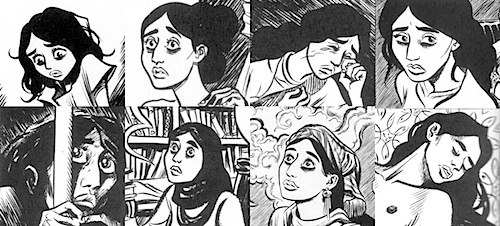HABIBI is definitely one of the year’s most puzzling books — despite being the followup to a beloved classic from a favorite creator, the reception has been quite mixed. Matthias Wivel is one of a trio of reviewers — Domingos Isabelinho and Ng Suat Tong are the other two — known for applying the most stringent possible personal standards to comics in their criticism. Thus, seeing Wivel come to the defense of HABIBI at The Hooded Utilitarian is a bit of a surprise — but he makes an unexpected point. Running down a host of critical beatdowns administered on that site over stereotypes and gender issues, he says that “parts of the comics intelligentsia seem to be developing an unhealthy obsession with ideological readings of comics.”:
I am not necessarily denying that the works in question, or indeed comics history more broadly, are haunted by such issues, nor am I arguing against choosing them as an avenue of criticism — Nadim Damluji’s examination of Habibi is a good example of a considerate approach, while Noah’s obliteration of certain recent DC books offers righteous polemic. The problem, rather, is that such criticism is often informed by a kind of ideological Puritanism that has gained traction in our current culture of taking offense — a Puritanism often blind to aesthetic quality, resistant to uncomfortable discourse, and prone to censorious action.
In the case of Habibi, it seems to me facile and unproductive to harp for too long on its sexism and Orientalism. Yes, it offers both and it suffers from it, but why does that have to be the full story? It is simultaneously, and obviously, a book so generous in intent and so voracious of ambition, that such criticism risks coming off as petty and, more importantly, ends up lacking in resonance.
But that’s as far as the defense goes, as he also takes HABIBI to task for the one thing that everyone seemed to like: even though the tropes were irksome and the storytelling was labored at times…GODDAM IT WAS BEAUTIUFLLY DRAWN — at least in the sense of Craig Thompson’s incredible mastery of line and pacing.
That isn’t enough for Wivel for the book to overcome its inherent melodrama:
The implied complexity of her emotion as she finally proposes a sexual union with her former charge Zam, after many years of separation, is for example undermined entirely by a banal progression from surprise to pity and doubt that simultaneously overstates and flattens the plea for redemption we are supposed to feel. Doughboy Zam’s evasive maneuvers and flitting baby eyes — supposedly a reckoning after years of denying his sexuality to the extent of self-castration — is not any more persuasive.
I would throw back at Wivel that an artist who is able to draw a succession of emotions like surprise, pity and doubt has something on the ball, but I get his argument. I found HABIBI amazing but flawed — the doubling back in time and space felt more like slack plotting. But the visual splendor — and emotional resonance from this splendor — has an undeniable power. as I read the book, almost every panel seemed to be the very incarnation of the things shown — as if there were no other way to draw it. Thompson is the master of the sympathetic line.
I’m not certain how much Wivel wanders from the path of comics intelligentsia into the forest of comics blogs and newssites, but should he ever decide to go pick some flowers on the way to his grandmother’s house, he’ll find that ideological criticism growing like kudzu. Is this an obsession or focus? The best comics are no longer looked at just as “junk entertainment.” They’re expected to contribute to the cultural dialogue—and sometimes they do. Telling the story of HABIBI with crappy drawing would have made it slow going, indeed. It’s the art that elevated it to be worthy of higher discussion.









I don’t get how people can hate Habibi. This is comics at their finest. The charges of sexism and orientalism are irrelevant in the context in which the story is being told.
Seconding Michael’s comment but this was an interesting post nonetheless.
Hi Heidi, thanks for the kind words! I’m not sure what you mean about the kudzu? There’s a lot of this kind of criticism today, some of it good, but quite a lot of it also reproductive of the unfortunate historical scholarly reception of comics, without showing much sensitivity to the material at hand. As I wrote in my piece, I think the criticism of Habibi’s Orientalism is a perfect case in point.
Note that I’m not talking about fan reception or more general reactions to the book, but academically-informed critics who I feel should know better.
But Michael: sexism and orientalism IS the context of Habibi.
Matthias: By kudzu I meant that issues of cultural (or multicultural) inclusion and sensitivity have dominated the blogosphere/comics punditocracy this year — in general, not just Habibi. It was definitely on people’s minds.
The idea that comics have a pundit class and an academically-informed critical class that can operate separately is another mark of maturation — for a long time they were all the same person and named James Van Hise — in the US anyway.
The sexism and orientalism some are referring to(excessively) you can’t even take seriously and Thompson is more mocking it while rolling his eyes.
Habibi overall from the times I Read it was
simply bloated and Zam’s half of the story was all in all uninteresting. There were times where I was editing the story and skipping parts I felt were pointless eye candy. The ending was a real dud and the overall read felt hollow in the sense that after following Dodola and Zam there’s little to reflect on but the flaws. Did I like it? yes definietly and I still recommend it to people who don’t read comics often, cause its such a “shock and awe” story that will keep someone new to comics interested.
Heidi, yeah, that’s right — that was what I was observing too. I think it’s probably a necessary step in comics criticism and analysis, but also one that’s causing a lot of growing pains for the field.
Oh, lest someone get the wrong idea, I should add that it was never my point that Habibi would have been better with “crappy” drawing, merely that I find it a little dismaying that people criticize the book while simultaneously praising the art, when the two can’t be separated.
@Mario, so you agree?